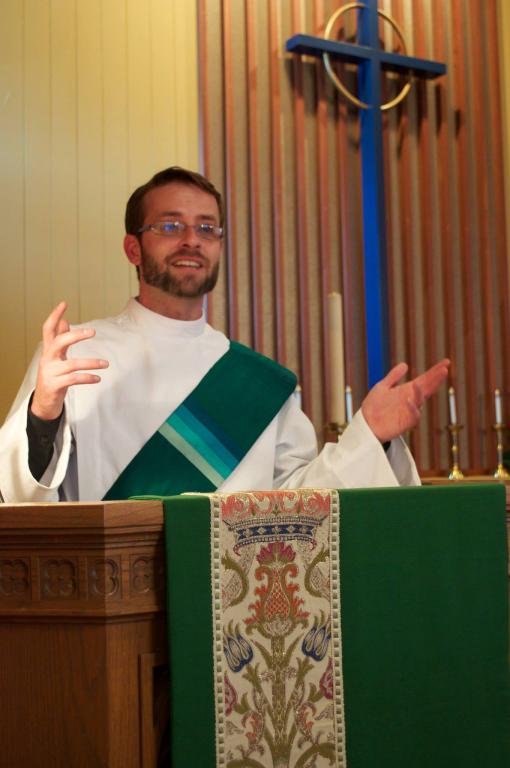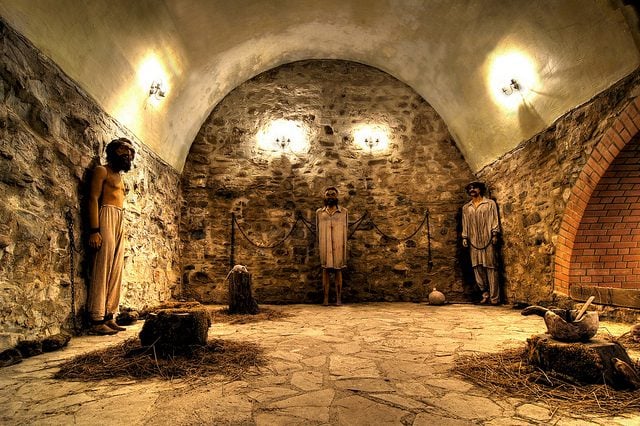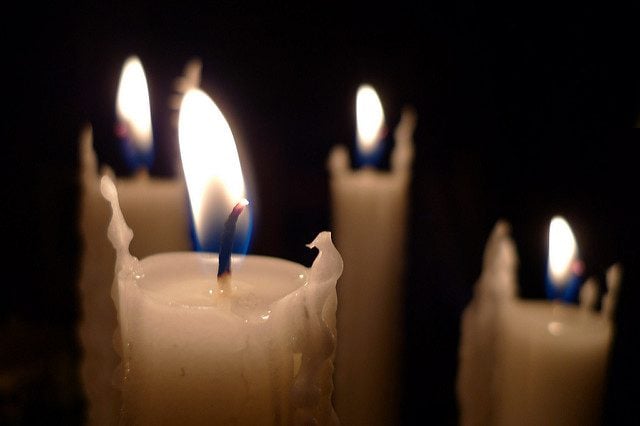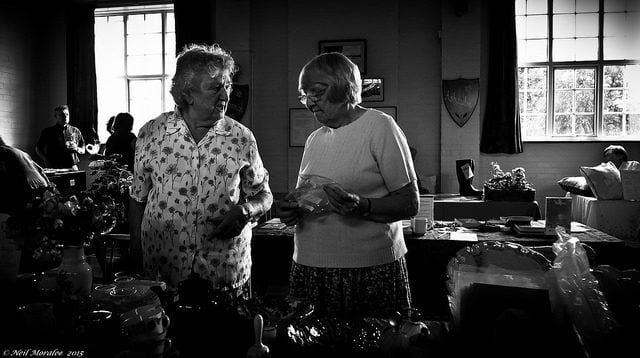 A few weeks ago, Ben Howard of On Pop Theology interviewed me on his podcast. During it, he asked me about my style of preaching and about how I compose my homilies. In it, I admitted to him that occasionally, I will change my sermons after I post them to my blog. The message largely remains the same, but I smooth out the transitions, add paragraphs, and often take a few away.
A few weeks ago, Ben Howard of On Pop Theology interviewed me on his podcast. During it, he asked me about my style of preaching and about how I compose my homilies. In it, I admitted to him that occasionally, I will change my sermons after I post them to my blog. The message largely remains the same, but I smooth out the transitions, add paragraphs, and often take a few away.
Sometimes it’s a simple matter of the response from folks on the Internet — a line or a message is unclear. Often it comes from the feedback I get from readers here on the blog, from friends on Facebook (I’m looking at you, Brad Landry and Mark Sandlin), or Twitter, or Tumblr. This can be the case when I let my own politics bleed over too much into my sermons. What works well on a blog may well offend from the pulpit, and then the message I’m actually trying to get across can become lost.
Other times, I want a more personal connection when I preach so I’ll add an anecdote or two in the mix. Sometimes, as with my homily on the Divisive Love of God, I will preach exactly what I blog. But on most occasions, I will change something.
I’ve come to realize blogging and preaching can be very different mediums, and I’m still navigating the balance between the two. What works online, in written form, often falls flat in front of a congregation and spoken aloud.
The more time in the pulpit I spend, the more I realize preaching isn’t just about a preacher being vulnerable. The congregation, in a traditional preaching set up, is vulnerable as well — perhaps more so. They are a captive audience. They can’t click away if they don’t agree with a sermon as they could on a blog. And they can’t skip to the comments to sound off their disagreement. They only get a few seconds in the receiving line.
It’s really not fair.
From the pulpit, I have to consider where people in the parish are in their lives, in their theologies and what I know they may be dealing with during the six and a half days in which they aren’t in church.
I have to consider their deep wisdom and their deep love.
Because those are the things I want to speak to.
And because often times I lack those things.
The feedback I get from my online community always improves my homilies for the parish where I serve. I am incredibly grateful for this as well, particularly as one still learning the art of the homily. You help me not put my foot in my mouth quite so often. I hope that the homilies you’ve read here have been as much of a gift as your feedback — good and bad — has been to me.
I hope one day to be in a place where I can implement this life-giving method of improving my homilies with people in my parish. I want to one day open up the sermon and preaching portion of the service — even when I’m the one speaking — to the deep wisdom and deep love of the people in the parish. Not only through dialogical sermons, but also through the research, planning, and composing process. That way, the sermon time in a service expresses itself as a collective speaking into the needs and lives of the parish from the parish.
I’m still playing with the idea, and I know other people might have experimented with this as well. I’d love to hear about those experiences. Have you ever opened up your sermon preparation time to your congregation? Have you ever been part of someone else’s sermon preparation?
In case you’re wondering, I completely rewrote this past week’s sermon the Rich Man and Lazarus. You can read the original here. I was tempted to write a two-line homily and leave it there. (There was once a rich man and a poor man named Lazarus at his gate. The rich man shutdown the gate so that no one could use it.) But what follows is what I actually preached on Sunday:
************
When I was in college, my roommate and I went on an impromptu road trip. It was Friday night, around 11 p.m. We didn’t have any plans, and clearly didn’t have any dates. So we hit the road, with no real plan on where to go. After two hours of traveling north on the interstate, we suddenly realized we had enough money for gas but not enough for a place to sleep or for food to eat. So we did what any hungry and broke college kid would do. We went to my parents’ house. But seeing how we didn’t get their until about 1 a.m., we thought it’d be a bad idea to walk into the house and wake them up, considering we didn’t even warn them we were coming.
That next morning, when my dad looked out the window to see if the newspaper had been delivered, he saw not a newspaper in the driveway but a strange silver Chevy Blazer with what appeared to be two young men in sleeping bags in the back.
I woke up to the the sound of a very concerned voice hesitantly saying hello and asking who was there. When I finally sat up, I saw my father, standing in the driveway in his pajamas, with a baseball bat in his hand.
When he realized who we were, he, of course, invited us in and fed us breakfast. But I don’t blame him for coming out the car with a baseball bat. I probably would have done the same. A car you’ve never seen before sitting in your driveway with two people sleeping in it. Yeah, I’d be concerned, too!
And imagine if instead of a car, it’s just a person who looks sick, homeless, dirty, and he’s sleeping on your front porch.
What do you do? Invite him in for breakfast?
Probably not. If you’re like me and most Americans, you’re going to call the police. And I don’t think anyone here would blame you.
That’s what makes our story today seems so unnerving. Because, truth be told, I identify more with the rich man than I do with Lazarus, even though the rich man is clearly the villain in the story. But 9 times out of 10, I act like the rich man.
And it’s disturbing, then, to read that the rich man winds up in a place of torment. And it’s downright shocking to us that how he treats one person lands him there.
But it probably wasn’t so shocking to the people in Jesus’ time. Chances are, they were already familiar with this story. In fact, many scholars believe Jesus in the parable borrowed heavily from already existing stories in which a poor person was rewarded, a rich person punished, and a chasm set between them where the rich person could see the comfort but never touch it. In fact, this storyline had existed in popular form for a long time in the Greco-Roman world, and Jesus’ audience would have readily identified it.
But what would have surprised Jesus’ listeners — and likely left them drop-jawed — was the appearance of Abraham, standing on Lazarus’ side and arguing with the rich man on behalf of the poor man.
It’s important to remember here that Jesus is telling this story to priests and religious elites who often lived in elaborate and posh mansions rivaled only by their Roman governors. And to these wealthy Jews, Abraham was one of them. His legacy belonged to them. It would have been jarring to think of Abraham arguing against them in the afterlife.
See, the popular theology of the day was not so different from our own in terms of wealth and poverty. To them, wealth wasn’t at the root of all kinds of evil. Rather, wealth was a sign of God’s blessing, just as it was with Abraham, the first Patriarch and father of all Jews. In fact, the Hebrew Scriptures are clear that not only was Abraham an exceedingly wealthy man, but his wealth was a direct blessing from God. So these wealthy folks to whom Jesus directs this parable would have thought of themselves in a direct kinship line with Abraham; they understood their wealth an inheritance from him.
On the other side of things, poverty, like we see in Lazarus, was generally thought of as a curse from God, as punishment for sin, moral failing, or wrongdoing. In other words, just as wealth was thought to be deserved blessing for righteousness, poverty was thought of as deserved punishment for sin. The divide was stark, and the chasm between them was fixed and immovable.
But Jesus places Abraham — the wealthy Patriarch and patron — on the side of the poor and the oppressed.
One can imagine the grumbling from the wealthy priests listening to him.
“Is this really our wealthy ancestor arguing for the poor man?” they might say.
“Did not God bless Abraham with wealth and prosperity just like God blessed the rich man?”
“Is not wealth from God, and poverty caused by someone’s sin and failings?”
If only it were that simple. But this parable is anything but simple.
See, I don’t think Jesus is telling a story about the reversal of fortunes in the afterlife. In fact, I don’t think the point of this story is about the afterlife at all. I think it’s very much concerned with this life and how we are living today.
Jesus isn’t even just telling a story that’s simply about exhorting individuals to do a better job with individual charity. The rich man and Lazarus aren’t individuals; they are archetypes, standing in for whole classes of people in Jesus’ time.
Instead, I think this story was a direct assault on the kind of theology that justifies exploitation and that blesses excessive wealth even if it wreaks havoc in society by refusing to share with those in need. With this story, Jesus upends the dominant narrative used to justify extreme wealth and the isolation of the wealthy from those in need. It upends an entire society’s beliefs about who the rich and poor were in God’s eyes, who was worthy and who was not, who was clean and who was not.
It upends the myth that the rich are righteous and their wealth is a blessing from God for their own personal enjoyment. It upends the myth that the rich don’t have a responsibility to the least of these in society.
These myths are our myths as well.
Even while in torment, the rich man still assumes Abraham is on his side and will listen to reason. He appeals to the Patriarch personally, referring to him as his father. But the rich man had forgotten something about his ancestor. In the Abrahamic tradition, wealth WAS meant for the community, not for the individual.
Wealth was not meant only for the enjoyment of the rich, but for the support and empowerment of the community, especially the poor, the oppressed, and the marginalized.
Wealth was only a blessing when it was shared.
Jewish tradition says that Abraham used his wealth and built a palatial mansion. But it wasn’t for himself. And unlike the rich man, he never barred entrance, but opened doors on all sides for all passersby to enter. There, in his mansion, was a massive banquet table, and on it, every kind of food and wine. Hungry and tired travelers entered, ate their fill. But when they went to thank their patron man for his generosity, Abraham pointed to God. He knew he was only a steward of God’s abundance. None of his wealth truly belonged to him. It belonged to God.
And because it belonged to God, it also belonged to all of God’s children.
In this parable, then, Jesus is reclaiming the rightful legacy of Abraham’s wealth as belonging to all Abraham’s children, not just the rich.
Indeed, the Law and Prophets of the Jewish tradition are clear on how people are to use wealth — large or small. Deuteronomy reminds us that “since there will never cease to be some in need on the earth, God commands us to , “Open our hands to the poor and needy neighbor in our land.” And Leviticus instructs that, “If any of our brothers fall into difficulty and their means falter, we shall support them and they shall live with us.”
“If any of our brothers fall into difficulty, we are to support them.”
Of course, it can be tempting to demonize the rich or wealthy with a parable like this, but Jesus here isn’t saying that wealth is bad and poverty is good.
Rather, he’s reminding us that we are responsible for each other, especially when we fall on hard times.
I think that’s the problem with the rich man in our story today. It isn’t his wealth. It’s that he is completely unaware of his own identity and of Lazarus’ identity.
To the rich man, Lazarus is below him, less than he is, subhuman, not worthy even to pick up the scraps of bread from the table like a dog.
Even when he sees Lazarus at Abraham’s Bosom, he still cannot fathom Lazarus as his equal. The rich man calls out to Father Abraham to send Lazarus on errands as if he were a slave, to fetch some water and to warn his brothers.
This final exchange between the rich man and Abraham is telling.
Because it reveals that the great unbridgeable chasm fixed between the rich man and Lazarus, between Abraham’s Rest and Hades’ torments, is of his own making.
In all his commanding, it never seems to occur to him — still — that Father Abraham is the father of the rich and poor alike, that Lazarus too is Abraham’s child, that Lazarus too is the inheritor of Abraham’s legacy and generous wealth.
It never occurs to him that by being a selfish steward of God’s wealth and Abraham’s legacy, he had deprived Lazarus of his rightful inheritance as a child of Abraham, and as such, the rich man had stolen Lazarus’ birthright to food, water, and shelter.
It simply never occurs to him that Lazarus is his brother, too.
On that ill-conceived road trip almost 10 years ago, my father invited us in because he recognized that the strangers in the Chevy Blazer weren’t really strangers at all.
They were his family and his friends. And so that morning we dined on country ham, scrambled eggs, and coffee. We laughed together. And even though our visit was unplanned, it wasn’t an inconvenience because we were family and we got to spend some unexpected time together. They didn’t resent us for eating their food, because in families we share our food and we feed each other when we are hungry.
How different our world would be if we saw strangers, the hungry, those in need of a little help in this way: not as strangers darkening our doorsteps but as beloved family members coming home to rest and celebrate.
And what if we started referring to those in need of help not as “the poor” or “the hungry,” or “those lazy people on the other side of town”, but as our brothers and sisters, as our siblings, as the children of God?














